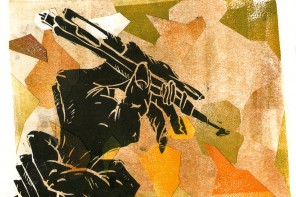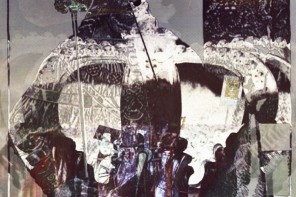During a memorable scene from his popular comedy series Louis, the famous comedian Louis C.K passionately berates his daughters, slumped in the back of his car, for complaining that they are bored. Not only does he describe why their perceived boredom is a great source of frustration for him but why it is also a vulgar and dismissive attitude towards all that exists:
“I’m bored’ is a useless thing to say. I mean, you live in a great, big, vast world that you’ve seen none percent of. Even the inside of your own mind is endless; it goes on forever, inwardly, do you understand? The fact that you’re alive is amazing, so you don’t get to say ‘I’m bored.”
This has gone down as one of the most seductive monologues in contemporary television. One that acknowledges our place in an infinitely fascinating universe as well as our paradoxical lack of satisfaction within it. It has spread across the Internet as a popular meme, possibly because it expresses a lingering and familiar feeling that many of us can identify with. But before we stigmatise a phrase, such as ‘I’m bored’, it is surely right for us to ask whether it really represents an anxiety worthy of our guilt and resentment. In recent decades technology and digital media have declared themselves to be the enemies of boredom and have been successfully subjugating it ever since. But what if we had been wrong about boredom all along? What if we had smeared and degraded something valuable?
The past is a seductive commodity with a booming extraction industry and its easy availability is obscuring the present like the never before. Music festivals and radio stations are dominated by so called ‘’heritage acts’’ and their contemporary acolytes, starved by a 30 year drought of musical innovation. Similarly, only one of last year’s top ten box-office films (Interstellar) was original; as opposed to a reboot, remake, sequel or franchise. Meanwhile, in mainstream politics, the confines of debate are widely perceived to be as ideologically narrow as ever. This is partly because many young people choose not to vote but also because our politicians have repackaged themselves as pragmatic managers of public life with no greater purpose other than to maintain and protect our fragile economies. This post-modern purgatory has been described as “static culture” and while it sounds like a symptom of boredom it may in fact be the precise opposite.
One of the best essays in favour of boredom was published back in 1993, long before the days of Facebook, Twitter and smartphones. Adam Phillips wrote his essay On Being Bored during his days as a child psychotherapist in London and describes his subject as a “state of suspended anticipation in which things are started and nothing begins, the mood of diffuse restlessness which contains that most absurd and paradoxical wish, the wish for desire.”
Phillips seeks to celebrate boredom and ask why we are so keen to suppress it. Boredom, he writes is “usually denied as an opportunity” because our lives are expected to be “endlessly interesting” by both ourselves and the people around us. Active engagement is considered to be a validatory and essential component of our identity and this, Phillips claims, is ruthlessly drummed into us from an early age. “It is one of the most oppressive demands of adults” he argues, “that the child should be interested, rather than take time to find what interests him. Boredom is integral to the process of taking one’s time.”
Boredom it seems, it fighting a war on multiple fronts. On one side there is work, a world that increasingly expects us to be ready, willing and able to act and react at any given instance. Many of us now have a handful of inboxes in our pocket and would think twice before ignoring them in what we imagine to be our free time. This isn’t just because workers are expendable in a saturated employment market. Productivity has been fetishised up to a point that the very act of being busy is widely considered to be as (or more) important than the act one is actually doing. As well as blindly respecting the busiest among us, we also tend to ignore the economic, political and societal factors that affect our own well-being. Many people feel that if they’re not satisfied with their career or their working conditions it’s because they simply didn’t try hard enough and this notion can be inescapable because it’s almost always impossible to know what life would be like if you had only worked a little harder. The only way to fight the idea that you’re not as successful as you could have been is to immunise and immerse yourself by working endlessly, whether your job is a meaningful one or not.
Then there is the second frontline. On top of the ever expanding nature of our professional commitments, which have blurred and melted into our free time, we are now closer than ever to the messages, gaming, art and entertainment that we love and there is rarely any real excuse not to be engaged. Meanwhile, the smartphone has become the social equivalent of an eject button. Anxiety, inadequacy, boredom, sadness, loneliness can all be temporarily escaped at an instant. (Even if most of the same feelings await you in the form of pixels.) It is now standard operating procedure, perfectly satirised in 2011 by the American songwriter Karen Kilgariff:
“If there’s a moment of silence, look at your phone.
And if you don’t know what to say, look at your phone
There’s no point looking around
everyone’s looking down
just look at your phone”
This is now our instinctive reaction to the gaps between belonging and a safe solution to the daily cerebral vacuums between our moments of inclusion. But what if those were the moments when we had our greatest ideas?
In Ghosts of my Life, Mark Fisher points out that it took little more than a decade for a musical landscape dominated by the Beatles to explode, like particles after the big bang, into a universe of genres, but that since that big bang the stars have barely moved. It is not merely reactionary nostalgia to recognise the exponential growth that occurred in the world of popular music between the mid 1960’s and the late 1970’s. This saw a journey from the Kinks and Hendrix to Kraftwerk, Talking Heads, all that is punk, all that is post-punk, disco, new wave and the genesis of rap. It was one hell of a ride, and if you’re my age (23) you could have experienced it all first hand in the time since you started listening to popular music. The slowdown since then and the tepid musical wasteland left over have, according to Fisher, dented our perception of progress and even perhaps our ideas of the future itself:
“The ‘futuristic’ in music has long since ceased to refer to any future that we expect to be different; it has become an established style, much like a particular typographical font. Invited to think of the futuristic, we will still come up with something like the music of Kraftwerk, even though this is now as antique as Glenn Miller’s big band jazz was when the German group began experimenting with synthesizers in the early 1970s.”
The modern vacuum, Fisher suggests, resembles a kind of broken cultural space-time continuum. We are lost between the movements of yesterday and lacking in any kind of clear generational identity. Perhaps popular music became a victim of its own success. Perhaps the strength and depth of the back-catalogs became inescapable and doomed musicians to a comfortable existence of crawling on the shoulders of giants. Fisher asks where the future went and how the perception of time itself became stagnant:
“Where is the 21st-century equivalent of Kraftwerk? If Kraftwerk’s music came out of a casual intolerance of the already-established, then the present moment is marked by its extraordinary accommodation towards the past. More than that, the very distinction between past and present is breaking down. In 1981, the 1960s seemed much further away than they do today. Since then, cultural time has folded back on itself, and the impression of linear development has given way to a strange simultaneity.”
It is worth noting that much of that innovation owed a large debt to technical leaps like the electric guitar, the synthesiser and advances in production, but the opportunities they presented must have seemed limitless at the time. For Fisher, music is merely a useful example used to chart a history of our collective imagination which has also manifested itself on our stale and cynical political stage. He argues that this period of optimism and innovation was only possible outside our current hyper-capitalised culture, when free access to higher education and adequate levels of access to affordable (and squatted) housing in big cities allowed people to experiment with more of their time and money. It’s a point well explained by Will Hodgkinson, Rupert Murdoch’s chief UK music critic. In a short essay called Ed Sheeran Is Killing Music he details the demise of the dangerous British rock band by lamenting the loss of the traditional cradles:
“Now the rehearsal rooms have been sold off and converted into flats. The pongy back rooms have been spruced up and turned into gastropubs, king scallop carpaccio on a bed of pink grapefruit taking the place of pork scratchings and a packet of KP nuts. The mid-sized venues are now cafes or branches of Giraffe, and it is no longer possible to use unemployment benefit as an unofficial arts grant because you’ll lose it unless you are seen to be actively seeking a job you really don’t want to get. All of that makes being in a band untenable for the vast majority of people.”
It is as if the natural habitats from which the endangered meaningful artists once emerged, are being bulldozed and monetised like a rainforest in Borneo being cleared for palm oil plantations. Hodgkinson goes on to say that this new landscape is the reason that the “people making music on equipment bought by their parents now dominate the charts” and complain that it is becoming a somewhat inauthentic middle-class game. (The same could be said of our politics too, now colonised almost exclusively by a demographically refined group of upper-middle class graduates from a handful of prestigious universities.) Now that our time has been monopolised by our bosses and the instantly enjoyable treasures of the past, we have, according to Fisher found ourselves living a world lacking in identity, writing:
“While 20th century experimental culture was seized by a recombinatorial delirum, which made it feel as if newness was infinitely available, the 21st century is oppressed by a crushing sense of finitude and exhaustion. It doesn’t feel like the future. Or, alternatively, it doesn’t feel as if the 21st century has started yet.”
I would be quite disappointing if artists, writers and politicians had failed to describe and distinguish the landscape of our generation from those in the recent past. But what Fisher fears may be worse. “It could be” he writes “that, in one very important sense there is no present to grasp and articulate anymore.”
We have, it seems, inadvertently created a predictable and repetitive cultural and political landscape, one that is very good and helping us to understand, learn from and enjoy our past but is also slowly sucking the significance and direction out of everything. But there is one perspective that may yet free us from this place lost in time. That is to recognize, embrace and exploit the underlying boredom of our time and reimagine our moonscape as a canvas. But to do that we cannot be afraid for saying ‘I’m bored’.







